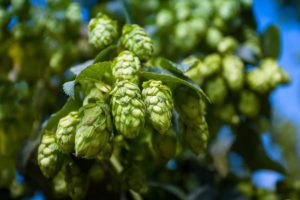Humulus is a plant. The dried, flowering part of the plant is used to make medicine.
Contents
Uses
It is a primary ingredient in beer brewing but can also be used as a supplement to induce calmness or help combat insomnia. It is particularly useful for insomnia which is accompanied by indigestion because it reportedly has a stomach-soothing quality.
Benefits
Hops is used for anxiety, inability to sleep (insomnia) and other sleep disorders, restlessness, tension, excitability, attention deficit-hyperactivity disorder (ADHD), nervousness, and irritability. It is also used to improve appetite, increase urine flow, start the flow of breast milk, as a bitter tonic, and for indigestion. Other uses include prostate cancer, breast cancer, ovarian cancer, high cholesterol, tuberculosis, bladder infections, intestinal cramps, an intestinal disorder called mucous colitis, nerve pain, and prolonged painful erection of the penis (priapism).
Hops is sometimes applied to the skin for leg ulcers and as an antibacterial agent.
In foods and beverages, the extracts and oil are used as flavor components. Hops are also used in brewing beer.
In manufacturing, the extract is used in skin creams and lotions.
Cautions
Hops are considered LIKELY SAFE when consumed in amounts commonly found in foods. Hops are POSSIBLY SAFE when taken by mouth for medicinal uses.
Special Precautions & Warnings:
Pregnancy and breast-feeding: There is not enough reliable information about the safety of taking hops if you are pregnant or breast feeding. Stay on the safe side and avoid use.
Depression: Hops may make depression worse. Avoid use.
Hormone sensitive cancers and conditions: Some chemicals in hops act like estrogen. People who have conditions that are sensitive to hormones should avoid hops. Some of these conditions including breast cancer and endometriosis.
Surgery: Hops might cause too much sleepiness when combined with anesthesia and other medications during and after surgical procedures. Stop taking hops at least 2 weeks before a scheduled surgery.
Interactions
- Alcohol interacts with Humulus
Alcohol can cause sleepiness and drowsiness. Hops might also cause sleepiness and drowsiness. Taking large amounts of hops along with alcohol might cause too much sleepiness. - Sedative medications (CNS depressants) interacts with Humulus
Hops might cause sleepiness and drowsiness. Medications that cause sleepiness are called sedatives. Taking hops along with sedative medications might cause too much sleepiness.Some sedative medications include clonazepam (Klonopin), lorazepam (Ativan), phenobarbital (Donnatal), zolpidem (Ambien), and others.
Other names
Asperge Sauvage, Common Hops, Couleuvrée, Couleuvrée Septentrionale, European Hops, Hop, Hop Strobile, Hopfenzapfen, Houblon, Humulus lupulus, Lupuli Strobulus, Lupulin, Lúpulo, Pi Jiu Hua, Salsepareille Indigène, Vigne du Nord
References
Source: WebMD, http://www.webmd.com/vitamins-supplements/ingredientmono-856-hops.aspx?activeingredientid=856&activeingredientname=hops
LiveStrong, http://www.livestrong.com/article/441921-natural-sleep-aids-while-taking-prednisone/

